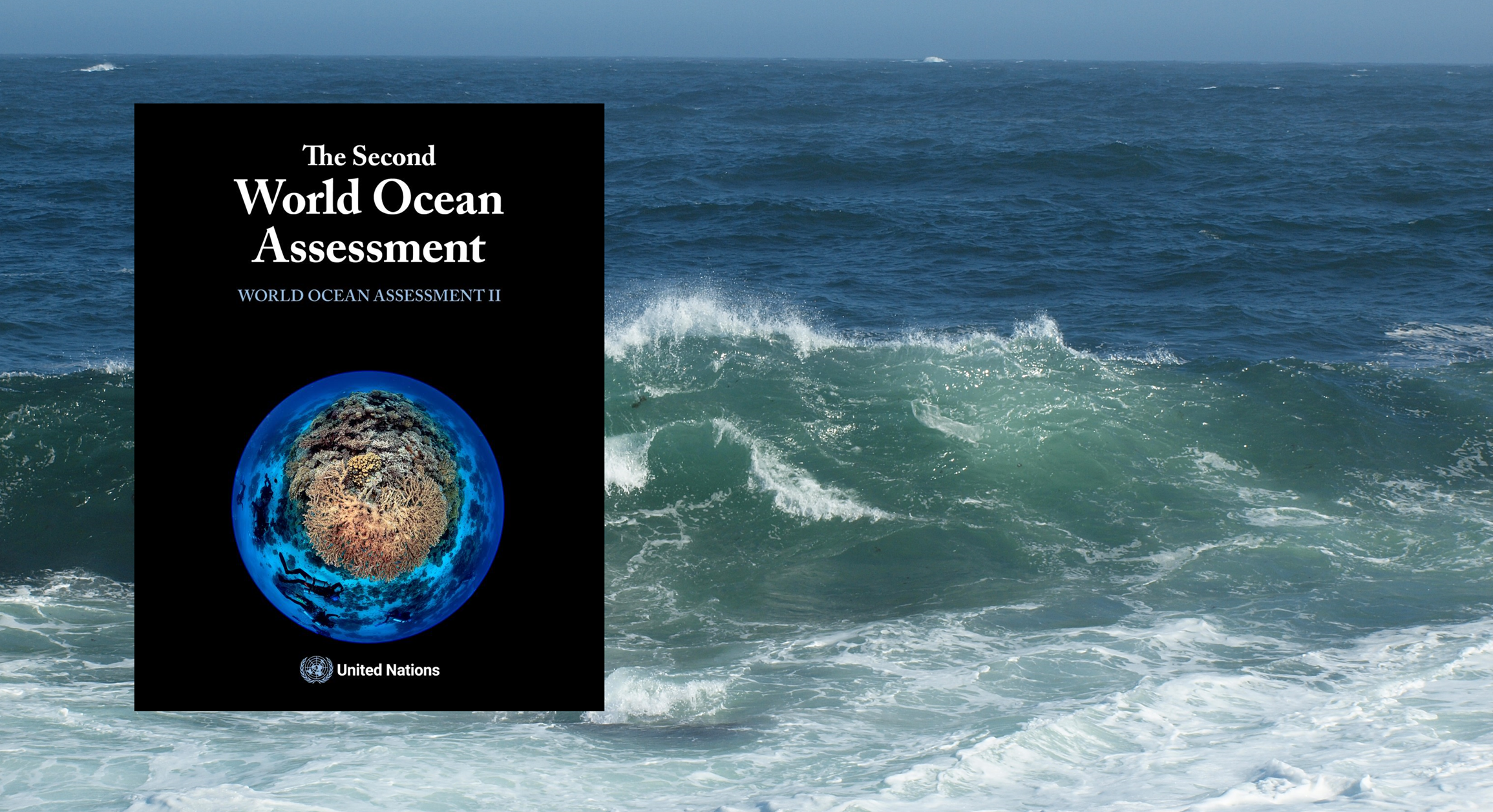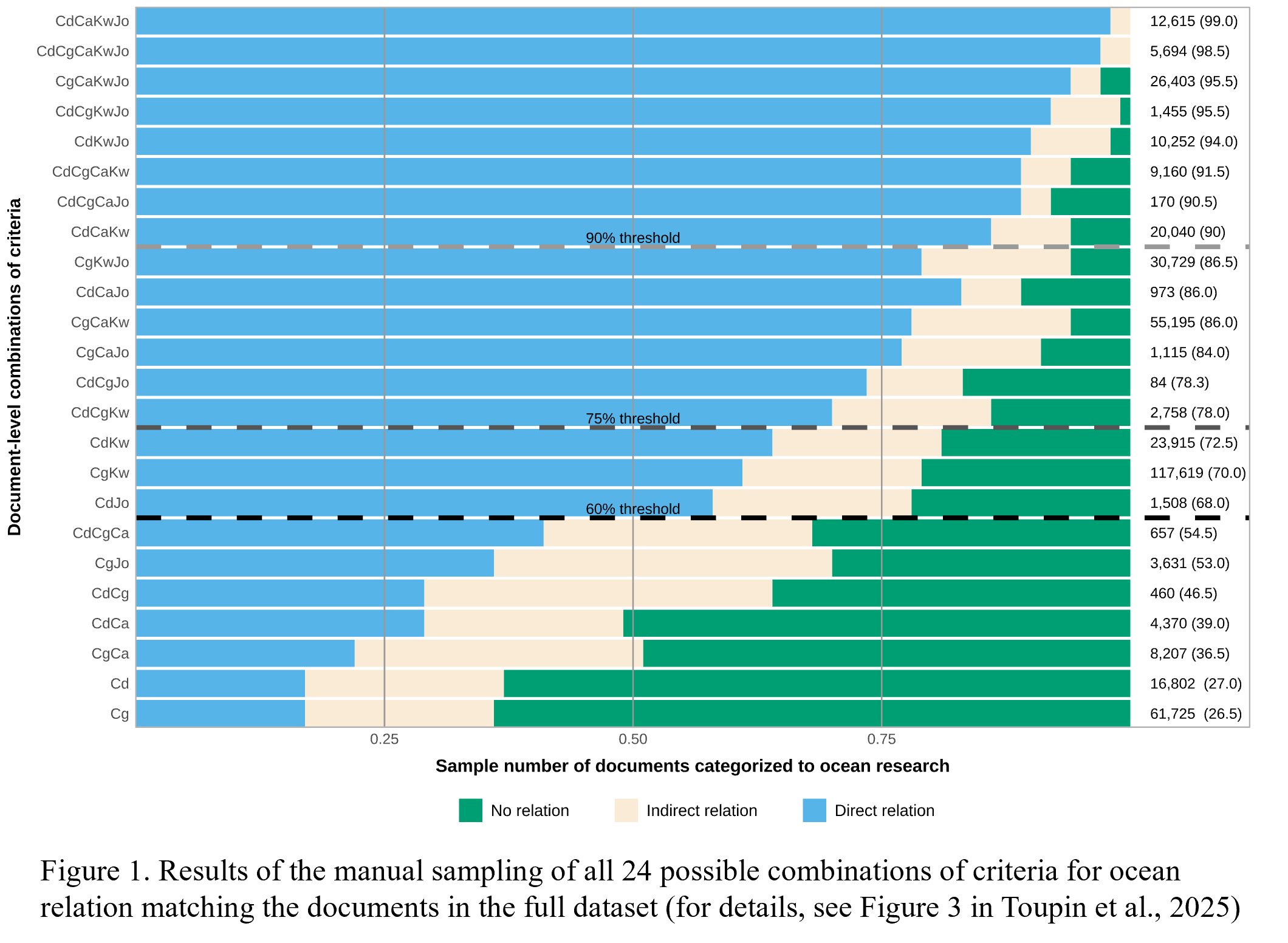Proclaimed in 2017, the UN Decade of Ocean Science for Sustainable Development (2021-2030) sparked opportunities to advance ocean-related fields and identify solutions to potential knowledge gaps, especially at the interface of research and governance. In a paper recently published in Ocean & Society, we explored the potential of using the references included in the two-volume United Nations (UN) Second World Ocean Assessment (WOAII) report (United Nations Office of Legal Affairs, 2021) as a beginning set of documents with which to identify the much broader body of ocean-related literature (Toupin et al., 2025). Specifically, our study highlights the contribution of this type of analysis to understanding of ocean governance processes, both as a methodological approach that can facilitate the identification and exploration of relevant ocean-related research literature, which could inform policymaking, and as an empirical basis for comparison of the scholarly structure of the larger body of ocean research to the references in the Second World Ocean Assessment report, which were selected to inform ocean governance.
The WOAII report is an integrated assessment of the environmental, economic, and social aspects of the ocean, produced as part of the cycle of the Regular Process for Global Reporting and Assessment of the State of the Marine Environment, including socioeconomic perspectives. The first report was published in 2017 and a third, covering the 2021-2025 cycle, will be launched shortly. Building on the contribution of multiple working groups, the WOAII provides a scientific foundation for policymaking as well as supplying a public and official state of knowledge about the ocean worldwide (United Nations Office of Legal Affairs, 2021). Through its topical structure and extensive synthesis of relevant knowledge – though reflecting the choices of the various working groups – the WOAII report served as a solid entry point for identifying and defining the broader body of outputs of ocean research.
While the identification of scholarly publications related to the UN Sustainable Development Goals has been a major focus of quantitative science studies in recent years, few have considered the potential of identifying research outputs through analysis of existing major knowledge syntheses. Our study aimed to demonstrate how knowledge synthesis reports (e.g., the WOAII report for SDG14 (Life below water), or those of the Intergovernmental Panel on Climate Change for SDG13 (Climate Action)) can be used to determine and demarcate broader bodies of relevant literature. After manually collecting the references from the WOAII report and linking them to the OpenAlex database to obtain the relevant metadata, we used their citation links (citations to or citations by) to build a larger set of research outputs extracted from OpenAlex. We observed, though, that not all the references assembled by this strategy were ocean-related. Therefore, we developed a process – based on the citation links, co-authorship relationships, a set of ocean-related keywords, and a list of relevant journals – to assess how the combinations of these criteria could aid in identifying outputs strictly related to the oceans (see Figure 1). Subsequently, we compared the references obtained from the WOAII report to the larger body of identified ocean literature and only selected references to publications that matched the better combinations of criteria.
Figure 1 illustrates the number of publications that fit within each combination of criteria and the overall performance score of each combination in terms of focusing strictly on oceans (based on the manual coding of a sample of documents for each combination). For example, we collected 12,615 references fitting the “CdCaKwJo” combination (that is, cited by another publication referenced in the report; linked by co-authorship with a publication cited in the report; included ocean-related keywords; and published in an ocean-related journal). The identification score for this combination is 99 (out of 100), meaning that it would capture publications that are mostly, if not all, ocean-related.
After building the larger set of ocean-related literature, we compared the references in this larger set to those in the WOAII report as a way of understanding the integration of research outputs in ocean governance advice. Among the key findings, we observed that the references included in the topical chapters of the report relied mostly on research published in high-profile omnibus journals, such as Nature, PLOS ONE, and Science, in contrast to more specialized marine journals found in the broader dataset, e.g., Marine Policy or Marine Ecology Progress Series. Nevertheless, two marine-focused journals, Frontiers in Marine Science and Marine Pollution Bulletin, occupy a central position in the references in both the report and the broader field of ocean research, highlighting the key position these journals may play at the science-policy interface. Notably, Frontiers in Marine Science is the most-cited journal throughout the WOAII report.
Another key finding of this study is the variation in both the total number of references per chapter and the number of references to research publications among the chapters. For example, in addition to being one of the chapters with the most references in the report, Chapter 6A: Plankton also has the highest proportion of research publications indexed in OpenAlex (94.5%). At the opposite of the spectrum, at 20%, Chapter 19: Changes in Hydrocarbon Exploration and Exploitation has the lowest proportion of references to outputs identified in OpenAlex. In the latter case, it appears that most references are for technical reports or news documents, reflecting the information choices of the working group that produced this topical chapter.
The key contribution of our study is a methodological proof of concept: we used a core set of references extracted from a knowledge synthesis report about the oceans, namely the WOAII, as a basis to identify the larger field of ocean-related literature. With this larger overview of ocean research, we can now continue to investigate how research outputs are actually taken up in ocean policymaking and management, which is a goal of the UN Decade of Ocean Science for Sustainable Development, namely, to foster transformative action about the oceans. Our findings could facilitate knowledge mobilization, whether as part of the work to prepare future World Ocean Assessments or for supporting ocean governance efforts more broadly. Determination of the extent of ocean research literature globally can expedite information sharing with decision-makers and other audiences, thereby informing policy and practices to address ocean challenges and promote transformative marine management.
References
Toupin, R., Krause, G., Riddle, P. N., Hare, M., & Mongeon, P. (2025). Identifying ocean‐related literature using the UN Second World Ocean Assessment Report. Ocean and Society, 2, 8924. https://doi.org/10.17645/oas.8924
Abstract: In recent years, ocean governance has called for strategic action and science‐informed policy to work towards the sustainable development of the ocean, most notably as part of the UN Decade of Ocean Science for Sustainable Development (2021–2030). This common framework identifies the integration of scientific knowledge in governance as a key process to deliver solutions responding to the current challenges, opportunities, and transformations posed by global change in the oceans. This article presents a methodological approach for identifying ocean‐related research outputs and documenting research‐based knowledge integration in documents that inform ocean governance. Specifically, this study builds on an analysis of the references included in the UN Second World Ocean Assessment report to (a) identify and describe the research outputs cited in the distinct chapters of the report, (b) identify research outputs relevant to ocean governance through the analysis of citations from and to references included in the UN Second World Ocean Assessment, (c) compare both datasets to examine the position of the literature cited in the report within a broader ecosystem of ocean‐related research, and (d) present a method to identify topically relevant research that could be integrated in future ocean assessments. Our findings show distinct referencing practices across chapters and expert groups and a higher reliance on high‐profile sources in the report compared to a broader dataset of ocean research outputs. Moreover, this study highlights an innovative approach to identifying ocean research based on knowledge syntheses and considers discussion points about integrating research‐based knowledge in documents informing ocean governance.
United Nations Office of Legal Affairs. (2021). The Second World Ocean Assessment: World Ocean Assessment II – Volume I & II. New York: United Nations. v. 1: xxiii, [i], 543 p.; v. 2: xvii, [i], 500 p. ISBN 978-92-1-604006-2. https://doi.org/10.18356/9789216040062
Author: Rémi Toupin
Tags: Information Use & Influence; Marine & Ocean Issues; Public Policy & Decision-Making; Science-Policy Interface
Image credit: Wave photograph, P. G. Wells

